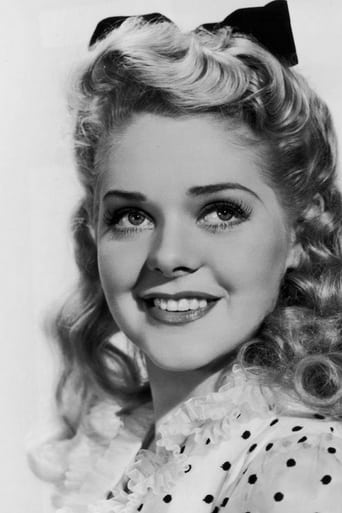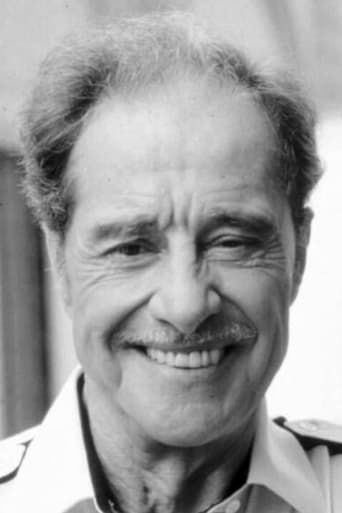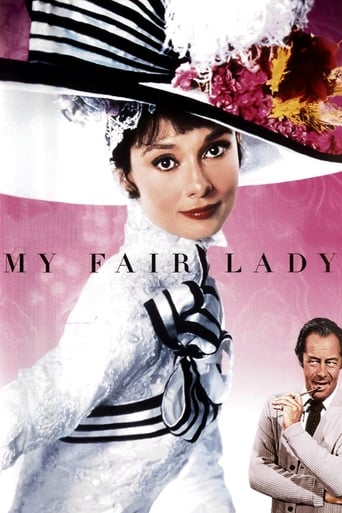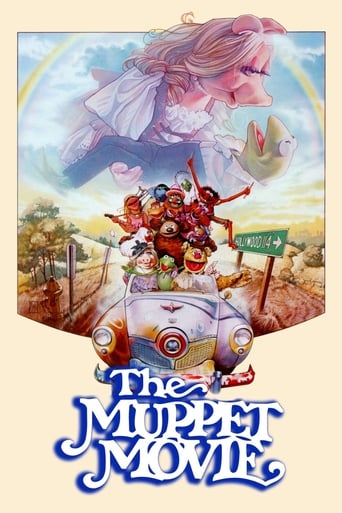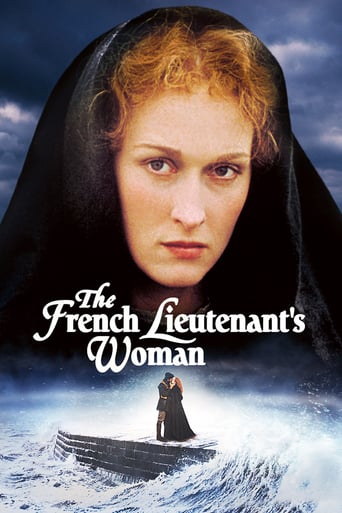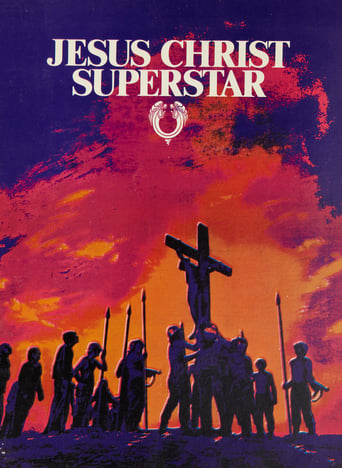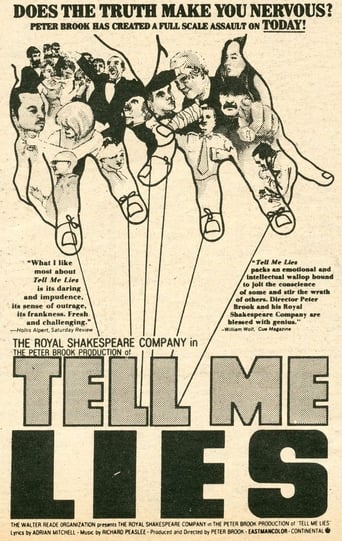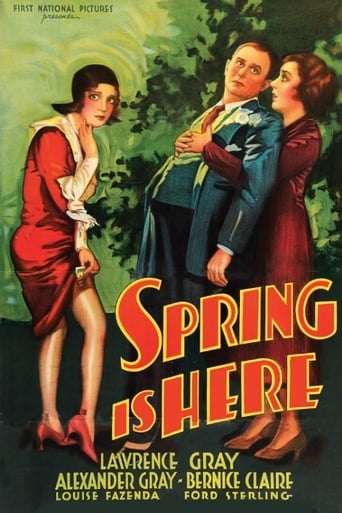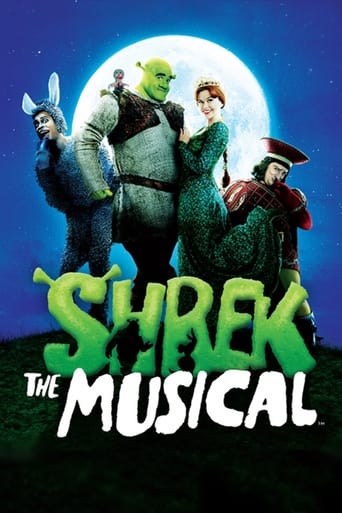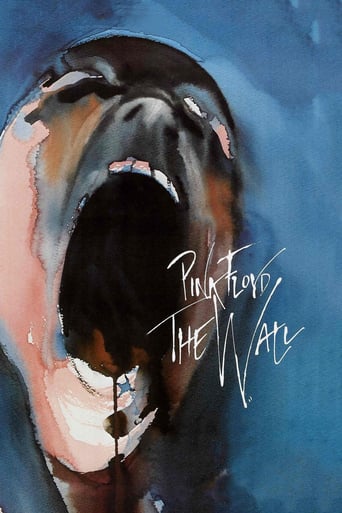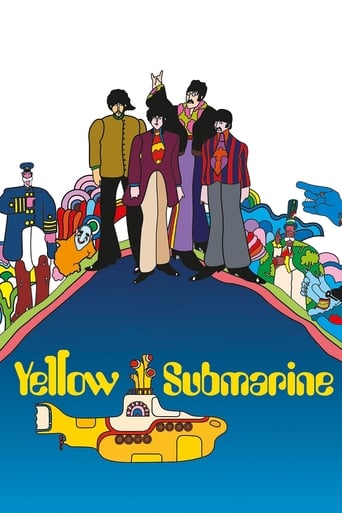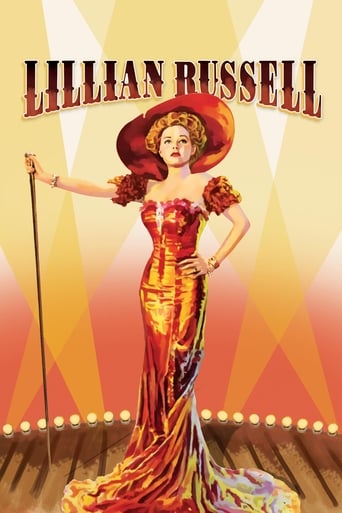
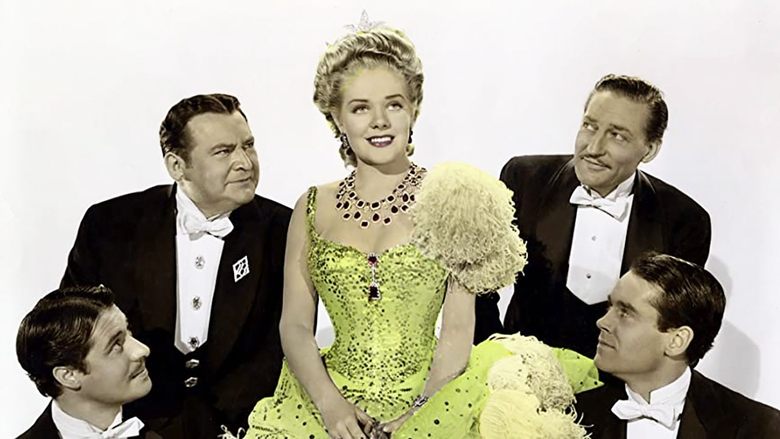
Lillian Russell (1940)
Alice Faye plays the title role in this 1940 film biography of the early-20th-century stage star.
Watch Trailer
Cast


Similar titles
Reviews
Lillian Russell was probably the first of her kind, as the DVD documentary on her life states. She was a role model for women of the late 1800's and probably the first Broadway musical diva. From her came Marilyn Miller, Ethel Merman, Mary Martin, Pearl Bailey, Chita Rivera, Bernadette Peters, Patti LuPone, Sutton Foster and Kristen Chenoweth, to name a few. This supposed biography tells her story from her shy beginnings to her encounters with such NY characters as Diamond Jim Brady and Tony Pastor, to several of her marriages. It skirts over many details, I'm sure, but makes a nice impression of her importance to the future of Broadway.I don't think that Alice Faye is playing Lillian Russell as she really was. Her Lillian is a nice girl with a desire to make it on the stage, and once you see her, you know she's gonna make it. Something tells me that Lillian Russell was a bit tougher than Faye plays her. Some people may not get Ms. Faye's success. She isn't outrageous or flamboyant, yet there is a simplistic beauty and elegance to her that makes you like her, because there is not one negative thing about her. Yet, she is no goody-goody that annoys because of a perfection that never could exist. She's simply not complicated, temperamental, or scandalous. This is probably the reason Faye's movies are still shown today. She was a gracious interviewee years after her retirement, shows no bitterness, and has a sentimental reflection of her past as shown in her teariness at talking about her supposed rival Betty Grable. Faye's elegance and loyalty to her co-stars makes her endearing to classic film audiences.She has four major male co-stars here, all very good. Henry Fonda is the reporter who saves her and her grandmother (the wonderful Helen Westley) in a run-away carriage. Don Ameche is the composer who wins her hand in marriage even though people like Tony Pastor (Warren William) and flamboyant Diamond Jim Brady (Edward Arnold in the second film in that role) pursued her. It is Fonda we see the most of, although there is a very funny bit with Warren William who says, "I have great faith in the telephone". You should, Warren; You're standing near the man who invented it (Don Ameche). Ameche isn't playing Alexander Graham Bell here, but it makes you wonder if the script writer threw that line in as a gag or if it was unintentional. His part is small, however; Supporting player Edward Arnold has more screen time, and makes every moment of it.Dorothy Peterson plays Faye's suffragette mother who believes that with women in power, there would be no more dishonest politicians and no more wars. She is more defined than Ernest Truex, as Lillian's father. As the aging grandmother, Helen Westley delights in every scene she has. I longed to see more of her. When Fonda encounters her towards the end of her life, Westley beautifully displays the life of a remarkable lady that almost makes you forget that the film is about her granddaughter. It's hard not to tear up knowing that these are her last scenes in the film, and that you'll hear in passing that she has indeed passed on. Nigel Bruce and Claud Allister are an amusing Gilbert and Sullivan, and Una O'Connor, who is usually shrill and ear-piercing, actually tones it down here. She is at her most likable and mellow, amusingly telling Faye "I wish I had your voice". The comedy of Weber and Fields seems quite dated, and some viewers might fast forward through to Faye's musical numbers. Cecil Cunningham, an underrated character actress who often steals every scene she was in through all her films, has an amusing bit as a newspaper secretary.I give this film a higher rating because it is simply exquisite to watch. Every detail is breathtaking from the costumes and scenery to the choreography and chorus numbers. Along with "Alexander's Ragtime Band", it remains 20th Century Fox's best musical of this era, something I'm afraid that can never be surpassed. Not until "With a Song in My Heart" came along would 20th Century Fox be able to do a biographical musical that was as outstanding.
Darryl Zanuck had high hopes for Lillian Russell, biographical picture of the turn of the last century stage star who was an American icon in the gaslight era. Even to hiring Irving Cummings as director. Cummings was a former stage actor who knew the great Ms. Russell back in her day. Alice Faye says he was of enormous help in capturing her character.Unfortunately the film is not helped by a ponderous script that loses the character of Lillian Russell by trying to cram too much in. Though the main men in her life are dealt with, a lot of facts were taken liberty with including a couple of husbands that were dropped.In her time Lillian was the most admired woman in America. She was a hefty woman in an era when that was the taste. Talk about full figured gal, take a look at a picture of Lillian if you can find one on the web. Jane Russell had absolutely nothing on her, in fact that is the only department where Alice Faye is deficient in her role.Of course when Alice Faye sings that's when the film is really something to watch. Starting with In Old Chicago, Darryl Zanuck had the inspiration of casting her in these period costume dramas whereas previously Alice had been Fox's answer to MGM's Jean Harlow. These became her best work and most loved by her legion of fans.Some new songs were brought in with some old standards. Alice's best moment is singing After The Ball twice during the film, a song very much identified with Lillian Russell. She also sings Come Down Ma' Evening Star which was the only song that Lillian Russell made an early gramophone recording of.Henry Fonda hated the film. Hated it because he was lost in a whole crowd of male admirers of Faye that also included Don Ameche, Warren William, Leo Carrillo, Nigel Bruce. Fonda and Ameche played two of her husbands that didn't get left out of the script. Warren William was millionaire/gambler Jesse Lewisohn, Leo Carrillo was the fabled 19th century theatrical impresario Tony Pastor where Russell got her start, Nigel Bruce was W.S. Gilbert with whom Russell had a most unsatisfactory relationship when she went to star in one of the Gilbert&Sullivan operettas. And Edward Arnold who was born to play the role of Diamond Jim Brady and who had made it his own in a biographical film a few years ago, does the role again. I do believe Zanuck would not have done the film if he couldn't have gotten him.Fonda in his memoirs felt he would get really top drawer parts after The Grapes of Wrath which he signed a studio contract with 20th Century Fox to get. Lillian Russell was not his idea of an upwardly mobile direction for his career. Though he did say he had nothing but good memories of working with Alice Faye.Besides Russell and her men the film has Eddie Foy, Jr. once again playing his famous father and you have a once in a lifetime chance to see Weber&Fields probably the greatest vaudeville comics of their time doing one of their routines. If Lillian Russell has no other value, it's great that their art was captured on film for future generations.So while the story leaves a lot to be desired, Lillian Russell is a great tribute to a star and her era as portrayed by another great star of another era, Alice Faye.
The actors were brilliant in trying to portray such a complex person in such a complex time. The costumes were beautiful.You do not have to use any imagination to try to figure out the characters and the way they dressed and the way they spoke.Thank you for doing such a wonderful job. This movie is a true treasure. We are surely blessed with such wonderful artists.These are truly gifted actors portraying a special time in our history.The theatre was such a huge part of the American culture. It was the only form of entertainment.It must of been very magical to witness a play by candle light.
LILLIAN RUSSELL (20th Century-Fox, 1940), directed by Irving Cummings, is a nostalgic film tribute to Helen Louise Leonard, better known as Broadway legend Lillian Russell (1861-1922), as portrayed by Hollywood legend Alice Faye in one of her more challenging roles of her career. Faye doesn't attempt to act nor sing like Lillian Russell, although it's hard to determine the actual personality of this legend, yet makes her characterization simple, sweet and sentimental in the usual Faye manner without making it look too much like a typical Alice Faye musical.The story opens in Clinton, Iowa, shortly before the outbreak of the Civil War, with the birth of the fifth daughter of Charlie Leonard (Ernest Truex), owner of a newspaper business, and Cynthia Leonard (Dorothy Peterson), pioneer for women's suffrage whom, after moving the family to New York City, runs and loses her bid as mayor. As for Helen, she grows up into an attractive young lady with a remarkable singing voice. Her grandmother (Helen Westley) wants her to be trained for grand opera by Leopold Damrosch (Joseph Cawthorn), who feels she'd be far more suited for something else. While "playing theater" in her backyard for her father, Helen is overheard by producer Tony Pastor (Leo Carrillo) who immediately hires her for his theater under the new name of Lillian Russell. Over the years she becomes a famous star, against her mother's objections, loved by wealthy suitors Jesse Lewisohn (Warren William) and the legendary Diamond Jim Brady (Edward Arnold). She eventually marries composer Edward Solomon (Don Ameche), settles in England for a time where she gives birth to their daughter, Dorothy. Before dying, Solomon completes a haunting ballad "Blue Lovebird" dedicated entirely to her. While going through fame and despair, Alexander Moore (Henry Fonda), a newspaper man, who has been coming in and out of her life for some time now, and assigned by his editor for her biographical interview, keeps to himself his everlasting love for the girl he known back home as Helen.The motion picture soundtrack mixing old and new song standards include: "Back in the Days of Old Broadway" by Charles Henderson and Alfred Newman; "Under the Bamboo Tree," "Comin' Thru the Rye" (Scotch tradition melody by Robert Burns); "The Strawberry Blonde," "My Evening Star" by John Stromberg and Robert B. Smith; "My Blushin' Rosie," "Adored One" by Mack Gordon and Alfred Newman; "Blue Lovebird" by Gus Kahn and Bronislau Kaper; "Blue Lovebird," "Blue Lovebird" (reprises); "He Goes to the Church on Sunday" by E. Ray Goetz and Vincent Bryan; "Waltz is King" by Mack Gordon and Charles Henderson; "The Tales of the Vienna Woods" by Johann Strauss Jr.; "After the Ball" and "Back in the Days of Old Broadway." A companion piece to ROSE OF WASHINGTON SQUARE (1939), with Faye in an unauthorized biography of Fanny Brice, along with supporting players assuming fictional names, ROSE and LILLIAN are met with production similarities. Originally a two hour piece, ROSE went through the editing process of 35 minutes, eliminating some great songs as well as comedy acts by the vaudeville comedy team of Joe Weber and Lew Fields. LILLIAN displays what ROSE might have been during its 127 minutes, indicating that maybe the wrong movie was dramatically downsized. A lavish scale musical-biography, LILLIAN succeeds most with its all-star cast, fine songs, plus added bonuses of Weber and Fields recorded on film, Eddie Foy Jr. playing his father, and for the second time on screen, Edward Arnold as Diamond Jim Brady, the role he originated in DIAMOND JIM (Universal, 1935). In spite of its pure accuracy in costume design and hair styles, recapturing the bygone era which ROSE didn't with its 1939 costumes in 1920s setting, the fault for LILLIAN lies on its weak script that might have be salvaged with Technicolor gloss instead of its standard black and white photography. Reviews then must have been mixed, but with fine support of big name and familiar actors, including Nigel Bruce and Claude Allister as Gilbert and Sullivan; and Una O'Connor as Marie, the maid, how could it fail? Yet, the big surprise is the third-billed Henry Fonda, straight from his triumph in THE GRAPES OF WRATH (1940). Not necessarily associated with musicals, it's been mentioned by various sources, including Bob Dorian, former host of American Movie Classics, where LILLIAN RUSSELL aired regularly prior to 1989, that Fonda was unhappy with this assignment, feeling that after several important projects under the direction of John Ford that he would be offered the chance to star mostly in prestigious assignments. As it stands, this project should have been an honor for him for that Fonda's name at this point, supported by a strong cast, to be beneficial to LILLIAN RUSSELL, but of course he didn't or couldn't see it that way. While the real Lillian Russell married four times, the movie only depicts one briefly and the fourth possible prospect, eliminating husbands two and three. Maybe adding a roaster of other popular 20th-Fox actors as substitute to the film's weak points might have helped some with the continuity.How much can be said about Lillian Russell that could stir up interest to a new generation today? Hard to say. At least with this depiction on her life, whether it be fact or fiction, Lillian Russell's name continues to live on, especially now whenever this screen treatment plays on the Fox Movie Channel. Thank goodness for film and what it represents. (***)


